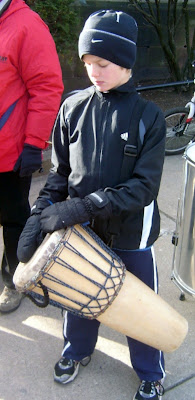The time between Christmas and New Year's is sometimes called "Tweener Week" because it falls be"tween" the holidays! It is not to be confused with the term "tween" which refers to people who are ten, eleven or twelve years old and thereby too old to be considered just children, but still not yet old enough to be teenagers. Tweeners can be distinguished by their undying devotion to their king, Justin Bieber.
I saw Bucketman on the bus.

The UMass campus is a scene of silent serenity with the students gone for winter break.

With Christmas over, the Amherst/Pelham Boy Scouts dismantled their tree stand.

A scene from Raos Coffee Shop in Amherst.

A view out the stickered window of the Amherst Starbucks.

We didn't have snow for Christmas, but Mother Nature obliged nicely the day after, transforming the woodland path into downtown Northampton into an icy white-way.

Arriving downtown, I saw our sorta magical town made even more so.

With the snow piled high in the middle of the street.

The only remnant of summer's green was this pot leaf in the window of The Hemp Store.

Happy New Year everybody! I predict that 2011 is going to be a really cool year. If you want to follow me, better look up, because that is where I 'll be, rising towards the Big Time, wherever that is.

Bus passing through downtown Springfield by S.P. Sullivan


































